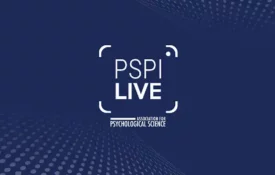PSPI Live
PSPI Live is a new online symposium series from APS that highlights recent or upcoming papers published in the APS journal Psychological Science in the Public Interest, or PSPI. These 60-minute live events feature a report review presentation by the authors and perspectives and reflections by other authors, policymakers, or representatives of important stakeholder groups.
Upcoming PSPI Live Events
Check back soon for information on upcoming PSPI Live webinars.
Past PSPI Live Events
PSPI Live: Developmental Science Research Informs Juvenile Justice Reform
Wednesday, January 24, 2024
3:00 PM – 4:00 PM ET (8:00 PM – 9:00 PM UTC)
The field of juvenile justice in the United States has gone through significant changes over the past 20 years thanks to its collaboration with developmental science. PSPI Live brings together the authors of a forthcoming publication in Psychological Science in the Public Interest, “Adolescent Contact, Lasting Impact? Lessons Learned from Two Longitudinal Studies Spanning 20 Years of Developmental Science Research with Justice-System Involved Youths.” Elizabeth Cauffman, a professor from University of California, Irvine, discussed the findings from two large-scale multisite longitudinal studies with members of the Orange County Superior Court and Orange County Public Defender Office. Maria Hernandez, the Presiding Judge, Tamika Williams, the Assistant District Attorney, and Frank Davis, the Alternate Defender, also shared their insights about the findings.
PSPI Editor: Nora Newcombe, Temple University
Read a related article here: Detention Fails to Help Young Lawbreakers Avoid Further Offenses, Report Shows
Viewing is limited to logged-in APS members and webinar registrants. Please login to view
PSPI Live: Understanding the Stigma Associated With Substance Dependence
Wednesday, October 25, 2023
Understanding the factors that contribute to substance dependence can be helpful to eliminate stigma against addiction.
Hear from Anne Catherine Krendl, the author of “Stigma Toward Substance Dependence: Causes, Consequences, and Potential Interventions” (Krendl & Perry, 2023), who was joined for comments and reflections by Seth Mnookin, Director of the Graduate Program in Science Writing, MIT and Rachael Cooper, Senior Director of the National Stigma Initiative, Shatterproof.
PSPI Editor: Nora Newcombe, Temple University
Read a summary of the event here: PSPI Live: Understanding the Stigma Associated With Substance Dependence
Viewing is limited to logged-in APS members and webinar registrants. Please login to view
PSPI Live–Persistence and Fade-Out of Educational Intervention Effects: Mechanisms and Potential Solutions
Wednesday, October 12, 2022
Understanding the factors that contribute to the persistence and fade-out of educational interventions can improve theories of human development and help to create meaningful interventions, with implications for practice and policy.
Hear from Drew H. Bailey and David S. Yeager, coauthors of “Persistence and Fade-Out of Educational Intervention Effects: Mechanisms and Potential Solutions” (Bailey, Duncan, Cunha, Foorman, & Yeager, 2020). The authors will be joined for comments and reflections by Mark Schneider, Director of the Institute of Education Sciences. The audience will have an opportunity to ask questions to all speakers.
PSPI Editor: Nora Newcombe, Temple University
Read a summary of this event here: What Makes Educational Interventions Stick? Teaching the Right Skills in the Right Environments
Viewing is limited to logged-in APS members and webinar registrants. Please login to view
PSPI Live: Psychological Interventions for the Treatment of Chronic Pain in Adults
Tuesday, June 28
Join APS as it continues its new webinar series focused on recent and upcoming issues of its journal Psychological Science in the Public Interest. Hear from Mary A. Driscoll and Robert D. Kerns, coauthors of “Psychological Interventions for the Treatment of Chronic Pain in Adults” (Driscoll, Edwards, Becker, Kaptchuk, & Kerns, 2021). The authors were joined for comments and reflections by Shari M. Ling, deputy chief medical officer of the Centers for Medicare and Medicaid Services in its Center for Clinical Standards and Quality; and Christin Veasley, cofounder and director of the Chronic Pain Research Alliance and advocate for increased awareness of chronic pain and its consequences.
This special event is ideal for APS members and members of the public, especially people with lived experience of chronic pain, health care clinicians and educators, scientists, and health policy advocates.
Read a summary of this event here: “A Staggering Public Health Problem”: Psychological Interventions for the Treatment of Chronic Pain
Event Speakers:
- Mary A. Driscoll, PhD, VA Connecticut Healthcare System and Yale School of Medicine
- Robert D. Kerns, PhD, VA Connecticut Healthcare System and Yale School of Medicine
- Shari M. Ling, MD, Centers for Medicare and Medicaid Services
- Christin Veasley, Chronic Pain Research Alliance
PSPI Editor: Nora Newcombe, PhD, Temple University
PSPI Live: Test a Witness’s Memory of a Suspect Only Once
Friday, April 29
Hear from John T. Wixted, lead author of “Test a Witness’s Memory of a Suspect Only Once” (Wixted, Wells, Loftus, & Garrett, 2021), who was joined by U.S. District Judge Jed S. Rakoff. At this hourlong event, participants heard an overview of Dr. Wixted’s recent publication, followed by special comments from Judge Rakoff. A dialog between Judge Rakoff and Dr. Wixted followed, including a special opportunity for event participants joining live to ask questions of both speakers.
This special event is ideal for anyone interested in the intersection of psychological science and law, or for those interested in the overlap between research psychology and policy broadly.
Read a summary of this event here: “Eyewitness Error: Malleable Memories, Flawed Legal Processes, and an Opportunity to Train”
Event Speakers:
- John T. Wixted, UC San Diego
- The Honorable Jed S. Rakoff, U.S. District Judge
PSPI Editor: Nora Newcombe, Temple University




